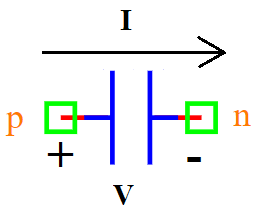This is the best way to explain, especially explaining the model (in the form of rst)
Capacitor
Symbol
Information

A capacitor is a passive electrical component that stores energy in an electric field. It consists of two conductive plates separated by an insulating material (dielectric). The fundamental equation governing capacitors is:
Where:
\(I\) is the current flowing through the capacitor (Amperes)
\(C\) is the capacitance (Farads)
\(\frac{dV}{dt}\) is the rate of change of voltage across the capacitor
Capacitors are used for energy storage, filtering, and coupling in electrical circuits.
Ports
p: Positive terminal
n: Negative terminal
Symbol description
Field |
Value |
|---|---|
Symbol.name |
Capacitor |
Symbol.file |
Capacitor.sym |
Symbol.directory |
Basic |
Symbol.referance |
|
Model.name |
|
Model.file |
Capacitor.py |
Model
The Capacitor model is class implements a Capacitor model.
A capacitor stores electrical energy in an electric field and its current is proportional to the rate of change of voltage across it.
Attributes:
V (signal): Input voltage signal across the capacitor, defined between nodes (p, n).
I (signal): Output current signal through the capacitor, defined between nodes (p, n).
C (param): Capacitance value in Farads (F), default is 1.0e-6 F.
Methods:
analog(): Defines the capacitor behavior using the equation:
from pyams.lib import model, signal, param, voltage, current
class Capacitor(model):
"""
Capacitor model based on the equation: I = C * dV/dt
"""
def __init__(self, p, n):
# Signal declaration
self.V = signal('in', voltage, p, n)
self.I = signal('out', current, p, n)
# Parameter declaration
self.C = param(1e-6, 'F', 'Capacitance value')
def analog(self):
"""Defines the capacitor’s current-voltage relationship"""
self.I += self.C * self.V.dt()
Command syntax
The syntax for defining a capacitor in a PyAMS simulation:
# Import the model
from pyams.models import Capacitor
# Cname: is the name of the capacitor instance
# p, n: The connection points in the circuit
Cname = Capacitor(p, n)